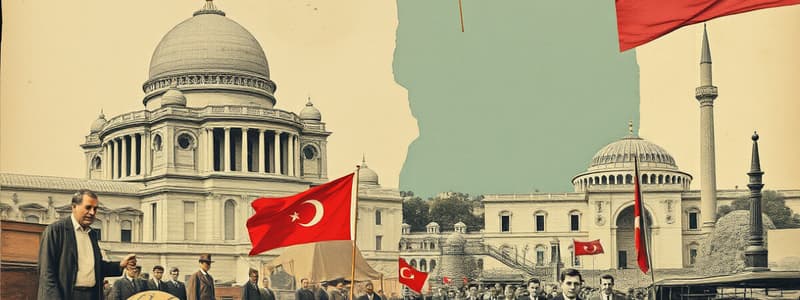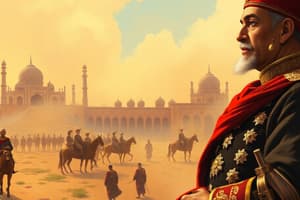Podcast
Questions and Answers
In 1979, Iranian militant groups took ___________________ hostage in Tehran.
In 1979, Iranian militant groups took ___________________ hostage in Tehran.
52 Americans
What was one reform that helped transform Turkey in the 1920s?
What was one reform that helped transform Turkey in the 1920s?
The nation granted women the right to vote.
Who led the Turkish nationalists in the 1920s?
Who led the Turkish nationalists in the 1920s?
Mustafa Kemal
Why did Islamic clerics criticize the shah of Iran?
Why did Islamic clerics criticize the shah of Iran?
What led to widespread protests in Iran in 2009?
What led to widespread protests in Iran in 2009?
Today, what does the fundamentalist movement in the Middle East call for?
Today, what does the fundamentalist movement in the Middle East call for?
What happened to the shah of Iran in the 1970s?
What happened to the shah of Iran in the 1970s?
What contributed to the growth of pan-Arabism in the Middle East in the 1940s and 1950s?
What contributed to the growth of pan-Arabism in the Middle East in the 1940s and 1950s?
How did Reza Pahlavi differ from Ayatollah Khomeini?
How did Reza Pahlavi differ from Ayatollah Khomeini?
What was an effect of the Arab Spring movement in Libya?
What was an effect of the Arab Spring movement in Libya?
Flashcards
Iranian hostage crisis year
Iranian hostage crisis year
The Iranian hostage crisis occurred in 1979.
Turkish women's voting right
Turkish women's voting right
In the 1920s, Turkish women gained the right to vote.
Turkish nationalist leader
Turkish nationalist leader
Mustafa Kemal led Turkish nationalists in the 1920s.
Shah's Westernization critique
Shah's Westernization critique
Signup and view all the flashcards
2009 Iranian protests cause
2009 Iranian protests cause
Signup and view all the flashcards
Fundamentalism's Middle East goal
Fundamentalism's Middle East goal
Signup and view all the flashcards
Shah's 1970s fate
Shah's 1970s fate
Signup and view all the flashcards
Pan-Arabism's 1940s-1950s growth factor
Pan-Arabism's 1940s-1950s growth factor
Signup and view all the flashcards
Shah vs. Ayatollah Khomeini policies
Shah vs. Ayatollah Khomeini policies
Signup and view all the flashcards
Arab Spring effect on Libya
Arab Spring effect on Libya
Signup and view all the flashcards
Study Notes
Iranian Hostage Crisis
- In 1979, Iranian militant groups took 52 Americans hostage in Tehran, marking a significant event in U.S.-Iran relations.
Reforms in Turkey
- The 1920s saw Turkey grant women the right to vote, a major reform that advanced women's rights.
Leadership in Turkey
- Mustafa Kemal, known as Atatürk, led the Turkish nationalists in the 1920s, driving the modernization of the country.
Religion and Politics in Iran
- Islamic clerics criticized the shah of Iran for his Westernization policies, which conflicted with Islamic traditions.
2009 Iranian Protests
- Widespread protests in Iran in 2009 were triggered by charges of election fraud, reflecting public discontent with the government.
Fundamentalist Movement
- The current fundamentalist movement in the Middle East advocates for adherence to Islamic political traditions, seeking to align governance with Islamic principles.
Overthrow of the Shah
- In the 1970s, the shah of Iran was overthrown and sent into exile, leading to a major shift in the country's political landscape.
Rise of Pan-Arabism
- During the 1940s and 1950s, pan-Arabism gained momentum in the Middle East as a reaction against Western political and cultural influence.
Contrast in Leadership
- Reza Pahlavi, the last shah of Iran, aimed for Westernization, while Ayatollah Khomeini embraced religious reform, significantly changing Iran's direction.
Arab Spring in Libya
- The Arab Spring movement in Libya led to an armed insurrection against the regime, resulting in the overthrow and death of Moammar Gadhafi.
Studying That Suits You
Use AI to generate personalized quizzes and flashcards to suit your learning preferences.
Description
Explore significant events in Iranian and Turkish history, including the Iranian Hostage Crisis, the reforms in Turkey during the 1920s, and the leadership of Mustafa Kemal Atatürk. Delve into the complexities of religion and politics in Iran, the 2009 protests, and the fundamentalist movement in the Middle East. Test your knowledge with this comprehensive quiz!



